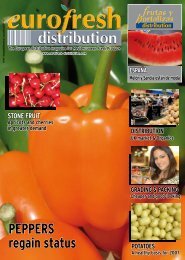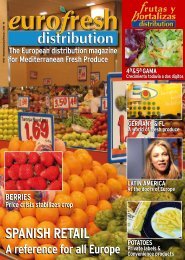produce - Eurofresh Distribution
produce - Eurofresh Distribution
produce - Eurofresh Distribution
You also want an ePaper? Increase the reach of your titles
YUMPU automatically turns print PDFs into web optimized ePapers that Google loves.
Produce<br />
Almeria, a display window<br />
of the Mediterranean production<br />
The biological pest control is applied to more than half of the volumes <strong>produce</strong>d.<br />
The biological pest control is brought<br />
into function on 11,400 hectares under<br />
the cultivation in Almeria region. The<br />
surface dedicated to the cultivation<br />
during the current campaign, according<br />
to the estimations of the Andalusia<br />
Council, is expected to reach almost<br />
19,000 hectares, which would result<br />
in a significant increase of production<br />
volumes rising up to 1,700,000 tons,<br />
implementing a growth of 65%, or, in<br />
other words, more than a half of the<br />
horticultural volumes <strong>produce</strong>d in the<br />
Almeria region.<br />
Due to the successful implementation<br />
of the biological pest control<br />
program, the surfaces dedicated to<br />
the cultivation of pepper as well as<br />
the commercial value of this product<br />
have shown an increasing tendency<br />
during 2007/2008 campaign, though<br />
the sector still has not fully recovered<br />
from the surfaces` reductions in 2006.<br />
As for the tomato sector, there has<br />
been registered an increase, especially<br />
in relation to the late plantation<br />
and biological pest control surfaces,<br />
which are foreseen to occupy in the<br />
Almeria region around 400 hectares.<br />
The Almeria professional organization<br />
of exporters, Coexphal, is known as<br />
the pioneer of the pest control practice<br />
in the Almeria region due to the<br />
company`s extensive program of professional<br />
training and field managing.<br />
"There are still some steps to take towards<br />
zero residue outcomes, but we<br />
are almost there in terms of insecticide<br />
protection" declares Jan van der<br />
Blom, the executive manager of the<br />
program. The company`s successful<br />
collaboration with the research centers<br />
resulted in the development of a<br />
new microbiological product against<br />
the Spodoptera exígua, a blight that<br />
significantly damages pepper plants.<br />
The Coexphal`s associated company<br />
Biocolor not only practices bio pest<br />
control in the Almeria region, but<br />
also participates in the various research<br />
projects aiming to promote<br />
some innovative products, as, for<br />
example, peripheral plants with a<br />
protective barrier against the dissemination.<br />
The Almeria market has turned into<br />
AENOR MARK<br />
Biological Pest Control Certificate<br />
The Spanish Standardization and<br />
Certification Association, AENOR, has<br />
been working with the food sector for<br />
over 1 years for added safety in this<br />
essential aspect of human health,<br />
which is also a strategic sector of<br />
the country’s economy. AENOR has<br />
over 00 specific standards in its<br />
catalogue and has issued over 1, 00<br />
certificates to food sector-related<br />
organizations.<br />
The AENOR Mark Biological<br />
Pest Control Certificate is one of the<br />
latest initiatives of Spain’s leading<br />
certification body. It is based on UNE<br />
1 000:2008 and on the UNE 1 00<br />
family of specific standards that set<br />
out the quality and guarantees which<br />
fruit and vegetables are required to<br />
fulfil, covering such diverse aspects<br />
as pest control methods, more<br />
stringent personnel training requirements,<br />
hygiene, protecting the<br />
environment or quality management.<br />
This new series of standards has<br />
been drawn up at the request of the<br />
growing and marketing sector asso-<br />
ciated with the Spanish Federation<br />
of Associations of Producers and<br />
Exporters of Fruits, Vegetables,<br />
Flowers and Live Plants, FEPEX, to<br />
certify and differentiate the <strong>produce</strong><br />
grown on farms where pest control<br />
is achieved by employing beneficial<br />
insects which are natural enemies of<br />
the pests, drastically reducing the<br />
use of chemicals.<br />
The standards for this certificate set<br />
out the cultural (growing methods)<br />
and biological methods (natural<br />
enemies of the pests) to be used for<br />
controlling each pest in each crop.<br />
This series of standards addresses<br />
the present tendency of the international<br />
markets to demand pesticide<br />
residue-free <strong>produce</strong>. The new certificate<br />
entails companies adopting a<br />
full (and audited) traceability system<br />
in which this differentiation is guaranteed<br />
from source.<br />
Maximum confidence<br />
Since the first UNE 1 000 standard<br />
was drawn up in 199 , the AENOR<br />
Mark has always been a label of<br />
PePPer<br />
the world biggest with the estimated<br />
turnover of 30 million Euros. For the<br />
current campaign almost 7,500 hectares<br />
are dedicated to the cultivation<br />
of pepper, as well as almost 30 % of<br />
8,500 hectares fall on tomato cultivation,<br />
and 40 % of 9,500 hectares<br />
dedicated to the cultivation of such<br />
winter cultures as cucumber, eggplant,<br />
and zucchini.<br />
Luis Miguel Fernandez, Agrocolor<br />
maximum confidence from the point<br />
of view of food safety and of the commitment<br />
of the certified companies<br />
and growers to continual inspection<br />
and fulfilment of the requirements<br />
demanded by the standard.<br />
The UNE 1 000:2008 standard is<br />
recognized as equivalent to the in-<br />
EUROFRESH<br />
DISTRIBUTION<br />
98<br />
OCTOBER<br />
NOVEMBER<br />
2 0 0 8<br />
Spain not only reached a position<br />
of the European leader of the sector<br />
according to the total amount of surfaces<br />
dedicated to the biological pest<br />
control cultivation and an estimated<br />
turnover of this market sector, which<br />
equals to 40 million Euros, but also<br />
confirmed its position among other<br />
countries of the Mediterranean region<br />
as Morocco, Egypt, and Turkey.<br />
ternational GLOBALGAP (EUREPGAP)<br />
IFA V .0 protocol and together with<br />
the UNE 1 00:2008 series of<br />
standards is also recognized as equivalent<br />
to the Andalusian Regional<br />
Government’s Technical Regulations<br />
for Integrated Production.




